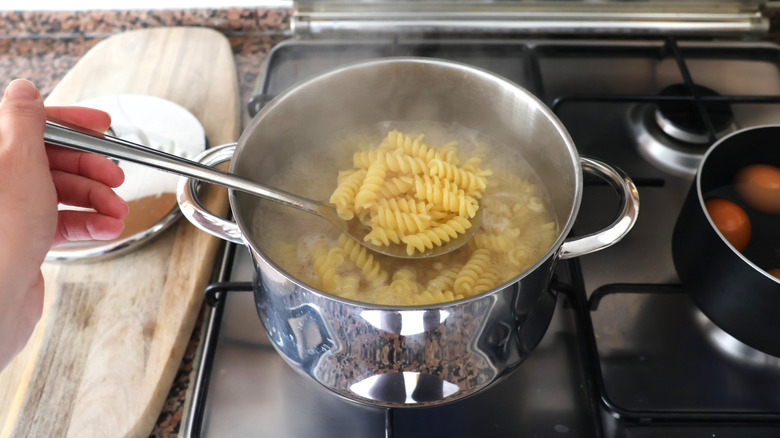
Jc Olivera/Getty Images
Born in Rome to a big Italian family, chef Giada De Laurentiis has cooked professionally at some of the most prestigious restaurants in America. But, as a TV host and cookbook author, she has remained firmly focused on the power of home cooked meals — and for an Italian-American like her, that almost always means pasta. Her cookbook “Everyday Pasta” was a New York Times best seller, and over the years De Laurentiis has shared dozens of tips for making the best pasta. Through it all, there is one message she has hammered over and over: Don’t waste your pasta water.
In a Youtube video, De Laurentiis explained that pasta water is important for finishing the sauce you serve with your pasta. “It creates a wonderful, velvety, thick sauce without any cream or anything else,” she said. This is because the starch that pasta releases into the water when you are cooking helps to emulsify and thicken the sauce. To do this, De Laurentiis recommends reserving at least a cup of the hot pasta water before you drain your pasta. She also says to add a bit of the water to your sauce a time as you stir it into your cooked pasta.
To that end she also warned that you should never, ever rinse your pasta after you drain it — something Stanley Tucci agrees with. “You need all the starch in the pasta to create a uniform dish where the sauce sticks to the pasta,” she said.
Giada De Laurentiis recommends using hot pasta water to thicken sauces and deglaze pans

TATIANA GAZIZOVA/Shutterstock
There is one other great use for pasta water that Giada De Laurentiis suggests — and that is deglazing a pan when making sauce. Lots of pasta recipes like De Laurentiis’ lemon zucchini spaghetti recipe require browning meat or vegetables in the pan, and that creates a lot of bits of caramelized food that gets stuck to the bottom of the pan. In cooking terms this is known as fond, and it contributes a lot of flavor to your food. Adding pasta water to a hot pan helps loosen the fond and incorporate its flavors directly into your sauce. This is often done with stock or wine, but De Laurentiis will also use the pasta water she is going to use to thicken the sauce anyway, getting it to do double duty.
Pasta water is an ingredient that should never be underestimated — and you shouldn’t throw out your pasta water after you’re done deglazing your pan and mixing your sauce, either. The starchy water can do for other dishes exactly what it does for pasta. All you need to do is save in the fridge – or even freeze it into individual ice cubes — and you can use pasta water in everything from soups and stews to gravies and sauces, or any other liquid you need to thicken without the need for cornstarch.


Dining and Cooking